Daily Vocabulary Words: List of Daily Used Words
Hi there. Welcome to this special section @ Wordpandit.
Our endeavour here is straightforward: highlighting important daily vocabulary words, you would encounter in The Hindu. This is your repository of commonly used words; essentially, we are posting a list of daily used words. Hence, this has significant practical application as it teaches you words that are commonly used in a leading publication such as The Hindu.
Visit the website daily to learn words from The Hindu.
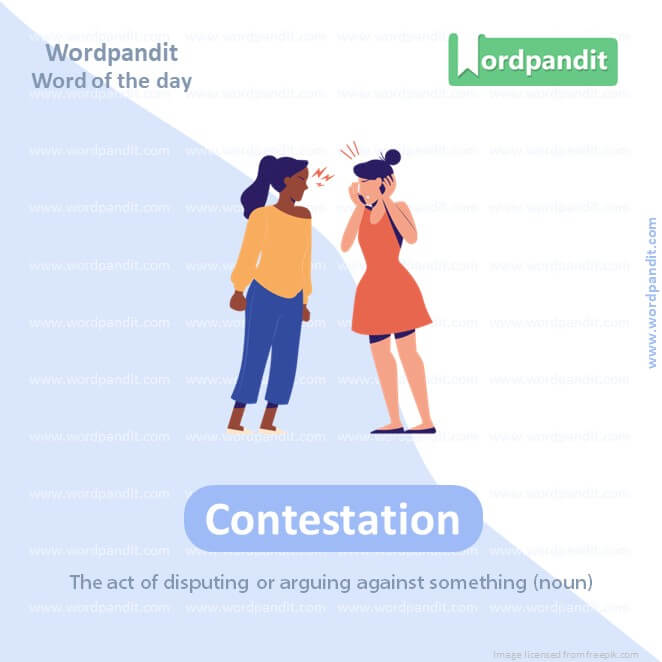
WORD-1: Contestation
CONTEXT: Why has the Constitution emerged as an explicit site of contestation in this election? The proximate trigger was the BJP’s declaration of “400 paar” (a reference to its assertion of winning 400 seats) and remarks, by some leaders, early in the campaign, that total electoral domination in this election would empower the BJP to change the Constitution. Opposition leaders were quick to mobilise.
SOURCE: The Hindu
EXPLANATORY PARAGRAPH: Think about when you and your friend both want to play with the same toy and can’t agree on who gets to play with it first. You both argue a bit about it. This kind of argument, where you both have different opinions and are trying to prove your point, is called “contestation.”
MEANING: The act of disputing or arguing against something (noun).
PRONUNCIATION: kon-tuh-STAY-shun
SYNONYMS: dispute, argument, disagreement, challenge, opposition
USAGE EXAMPLES:
1. There was a contestation over the final score in the game.
2. The lawyer prepared for a contestation of the will.
3. There’s always contestation in meetings about project budgets.
4. The new policy led to much contestation among the staff.
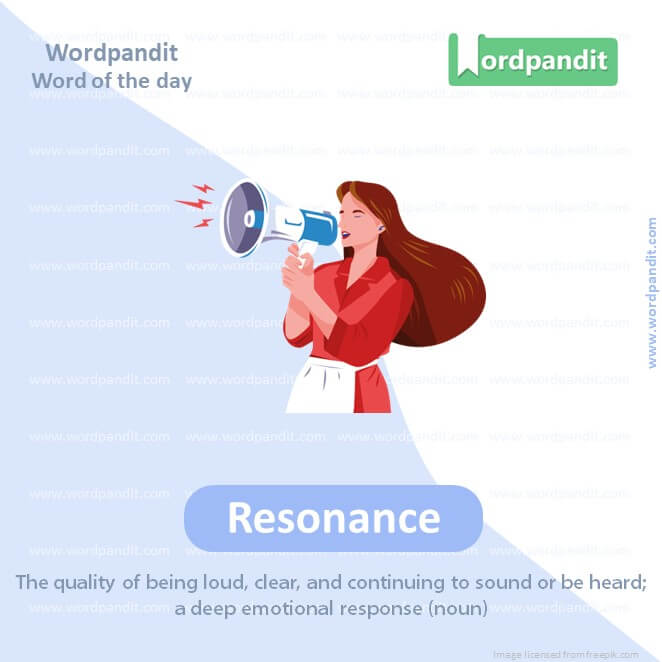
WORD-2: Resonance
CONTEXT: The Opposition has declared this election to be a battle for “saving the constitution” and it is having resonance on the ground.
SOURCE: The Hindu
EXPLANATORY PARAGRAPH: Imagine you hit a drum and you can hear the sound it makes echoing loudly. That sound that fills the room and vibrates a bit is called “resonance.” It’s like when something is so interesting or important that it makes you think about it a lot.
MEANING: The quality of being loud, clear, and continuing to sound or be heard;
a deep emotional response (noun).
PRONUNCIATION: REZ-uh-nuns
SYNONYMS: reverberation, echo, richness, depth, impact
USAGE EXAMPLES:
1. The singer’s voice had a beautiful resonance.
2. The story’s theme had a deep emotional resonance with many readers.
3. The resonance of the bell could be heard across the valley.
4. His words had a strong resonance at the ceremony.
WORD-3: Conspicuous
CONTEXT: The silence around the constitutional aspiration of secularism remains conspicuous against the backdrop of the deeply poisonous and divisive Hindu-Muslim rhetoric that has dominated this election.
SOURCE: The Hindu
EXPLANATORY PARAGRAPH: Imagine wearing a bright neon shirt in a group of people who are all dressed in dark colors. You would stand out a lot, right? That’s what “conspicuous” means—something that is very easy to see or notice because it’s different from everything around it.
MEANING: Easily seen or noticed; attracting attention, often deliberately (adjective).
PRONUNCIATION: kun-SPIK-yoo-us
SYNONYMS: noticeable, obvious, prominent, evident, striking
USAGE EXAMPLES:
1. He wore a conspicuous red hat.
2. The mistake in the document was conspicuous.
3. She felt conspicuous wearing such a bright dress.
4. The conspicuous sign helped us find the location.
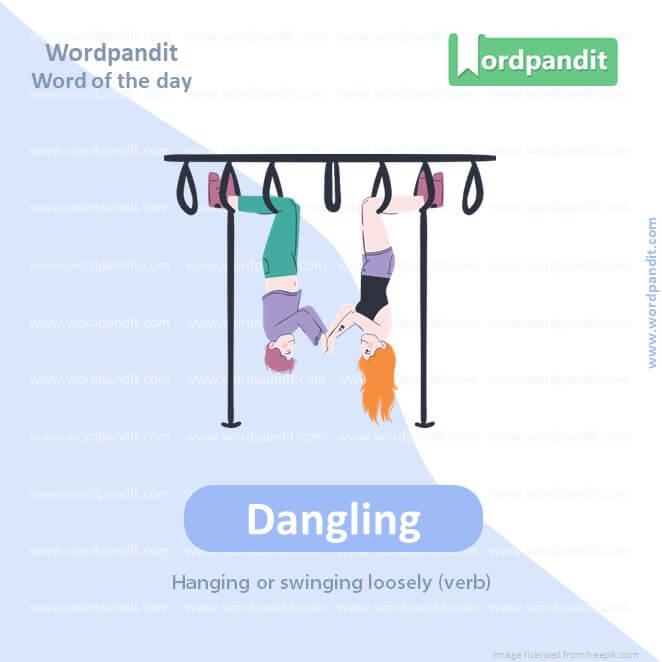
WORD-4: Dangling
CONTEXT: The Leader of the Opposition, V.D. Satheesan, who belongs to the Congress, accused the government of dangling the prospect of lifting dry days and extending bar timings in exchange for sizeable backhanders from the liquor lobby.
SOURCE: The Hindu
EXPLANATORY PARAGRAPH: Imagine a spider hanging from a single thread of its web. The way the spider hangs loosely and swings a little bit is called “dangling.” It’s like when something is hanging down and moving slightly in the air.
MEANING: Hanging or swinging loosely (verb).
PRONUNCIATION: DANG-gling
SYNONYMS: hanging, swinging, swaying, pendulous, suspended
USAGE EXAMPLES:
1. The child sat on the edge of the table, legs dangling.
2. There was a pair of shoes dangling from the power line.
3. The participles were dangling in her rushed sentence.
4. He was dangling a piece of string for the cat to play with.
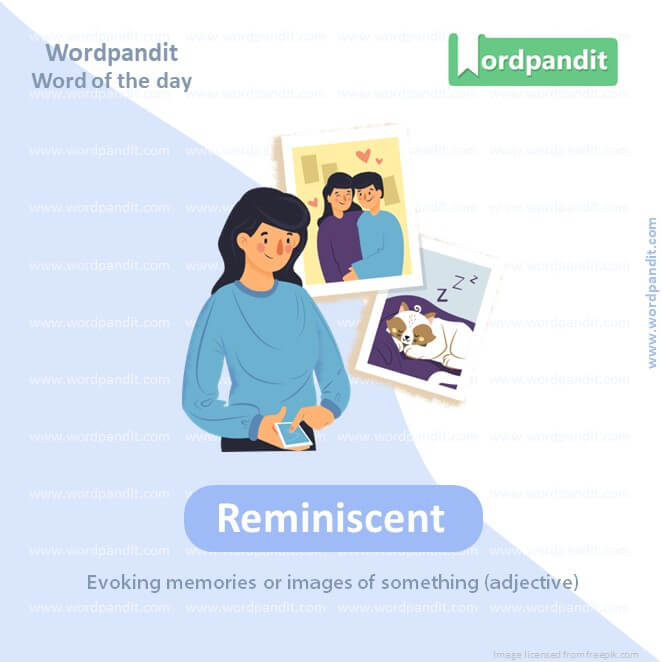
WORD-5: Reminiscent
CONTEXT: The current controversy has therefore evoked a sense of political déjà vu. The UDF is all set to launch anti-government protests, would be reminiscent of the restive days of 2016.
SOURCE: The Hindu
EXPLANATORY PARAGRAPH: Think about when you smell cookies baking and it reminds you of baking with your grandma. When something makes you think of another thing because they are similar, that’s being “reminiscent.” It’s like a memory that comes back because something is similar to what you remember.
MEANING: Evoking memories or images of something (adjective).
PRONUNCIATION: rem-uh-NIS-unt
SYNONYMS: evocative, suggestive, reminiscential, remindful, redolent
USAGE EXAMPLES:
1. The music was reminiscent of her childhood.
2. His style is reminiscent of the great jazz musicians.
3. The smell of pine was reminiscent of winter holidays.
4. The movie’s theme is reminiscent of a classic love story.
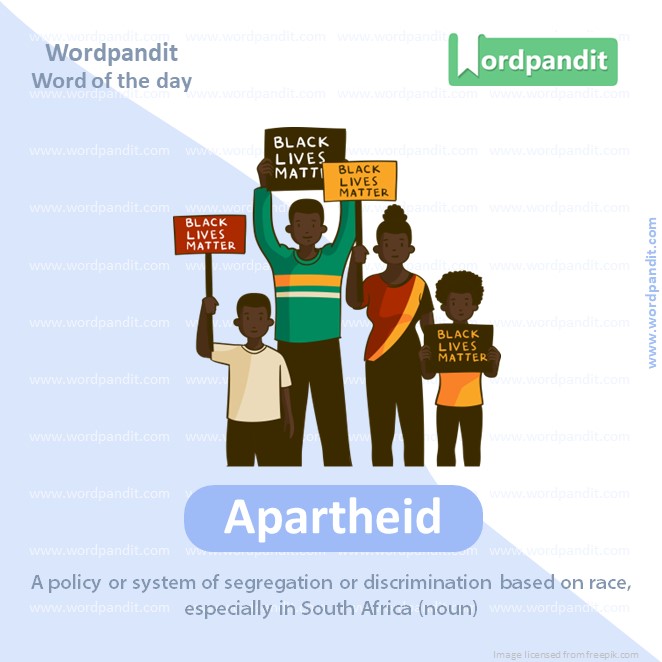
WORD-6: Apartheid
CONTEXT: South Africa in the apartheid era and the Serb Republic of Yugoslavia during the brutal ethnic cleansing era were barred from participating in the UNGA.
SOURCE: The Hindu
EXPLANATORY PARAGRAPH: Imagine a rule where people with different hair colors couldn’t play together or go to the same school. Some people with one hair color could go to certain places, but others couldn’t just because of their hair color. That’s similar to “apartheid,” which was a real rule in a country called South Africa, where people were separated and treated differently based on their skin color.
MEANING: A policy or system of segregation or discrimination based on race,
especially in South Africa (noun).
PRONUNCIATION: uh-PAR-tite
SYNONYMS: segregation, discrimination, racism, separation, exclusion
USAGE EXAMPLES:
1. Apartheid was abolished in South Africa in the early 1990s.
2. The museum exhibit on apartheid educates visitors about its history and impact.
3. Many books and films have explored the effects of apartheid on society.
4. Leaders around the world spoke out against apartheid and supported its end.
WORD-7: Consequent
CONTEXT: The LDF’s agitation then cost two UDF ministers their Cabinet berths, though the consequent anti-corruption inquiry came to nought.
SOURCE: The Hindu
EXPLANATORY PARAGRAPH: Imagine if you forget to bring your lunch to school, and because of that, you’re really hungry during lunchtime. The hunger is a “consequent” of forgetting your lunch—it happened because of what you did earlier.
MEANING: Following as a result or effect (adjective).
PRONUNCIATION: KON-suh-kwent
SYNONYMS: resultant, ensuing, following, subsequent, resulting
USAGE EXAMPLES:
1. The consequent delay was due to unexpected weather conditions.
2. Consequent to the new policy, there were many changes in the workplace.
3. The accident was a direct consequent of careless driving.
4. She felt tired, a consequent of staying up too late.
WORD-8: Insurmountable
CONTEXT: What does everyday life look like for deaf people? Public transport announcements, TV shows, directions within public structures, and even calling helplines are made insurmountable tasks due to a lack of accessibility.
SOURCE: The Hindu
EXPLANATORY PARAGRAPH: Think about a wall so high that no matter how much you tried, you couldn’t climb over it. When something is too difficult to overcome or deal with, like that very high wall, it’s called “insurmountable.”
MEANING: Too great to be overcome (adjective).
PRONUNCIATION: in-sur-MOUN-tuh-bul
SYNONYMS: unbeatable, invincible, overwhelming, impossible, unattainable
USAGE EXAMPLES:
1. The difficulties they faced seemed insurmountable at first.
2. He was faced with what appeared to be an insurmountable challenge.
3. The mountain was an insurmountable barrier in the early days of exploration.
4. Their differences proved to be insurmountable, leading to the project’s failure.
WORD-9: Buffeting
CONTEXT: It should be taught by DHH individuals, further buffeting their employment opportunities.
SOURCE: The Hindu
EXPLANATORY PARAGRAPH: Imagine you’re trying to walk against a really strong wind that keeps pushing you back every time you take a step. This pushing by the wind is similar to “buffeting.” It’s when something, like wind or waves, hits something else repeatedly and with a lot of force.
MEANING: Striking repeatedly and violently; battering (verb).
PRONUNCIATION: BUFF-uh-ting
SYNONYMS: battering, pounding, hammering, pummeling, thrashing
USAGE EXAMPLES:
1. The small boat was buffeting against the strong waves.
2. She struggled against the buffeting winds.
3. The trees were buffeting in the storm last night.
4. His confidence was buffeting under constant criticism.
WORD-10: Concordant
CONTEXT: DHH patients benefit from receiving care from language-concordant physicians.
SOURCE: The Hindu
EXPLANATORY PARAGRAPH: Imagine everyone in your class agrees to play the same game and follow the same rules. When everyone agrees or things go together well, it’s called “concordant.” It’s like when things match up or are in harmony.
MEANING: In agreement or harmony (adjective).
PRONUNCIATION: kuhn-KOR-dunt
SYNONYMS: harmonious, agreeing, compatible, consistent, congruent
USAGE EXAMPLES:
1. Their stories were concordant, which made the evidence stronger.
2. The test results were concordant with the initial diagnosis.
3. Their plans were concordant, so the project proceeded smoothly.
4. The design elements were concordant with the historic style of the building.
Vocabulary Daily Use
In the fascinating world of language learning, we often concentrate on taking giant leaps, but the real magic lies in the small steps of ‘vocabulary daily use’. These frequently used words and phrases form the backbone of practical communication and understanding. Therefore, mastering ‘vocabulary daily use’ is a crucial element in achieving language fluency.
To effectively learn ‘vocabulary daily use’, one needs to venture beyond the traditional textbook resources. The real essence of these words unveils itself in everyday exposure and interactions. Engaging with a variety of material like novels, magazines, newspapers, podcasts, films and digital content deepens the understanding of ‘vocabulary daily use’. Immersion in these contexts yield natural, everyday language that bridges the gap between the classroom and the real world.
The journey of mastering ‘vocabulary daily use’ necessitates the integration of innovative memory techniques. Flashcards and the Leitner System aid in embedding these words into your long-term memory by promoting active recall. Additionally, the use of mnemonic devices, which allow you to associate ‘vocabulary daily use’ with personal and familiar narratives, can enhance your ability to remember and recall these words.
Moreover, it’s important to remember that ‘vocabulary daily use’ isn’t just about comprehension- it’s about practice and active usage. Incorporate these words in your day-to-day communication and social interactions. This not only solidifies your understanding but also accelerates learning and internalization of ‘vocabulary daily use’.
In a nutshell, mastering ‘vocabulary daily use’ is a continual process that demands exposure, creative learning strategies and assertive practice. The commingling of these tactics brews the perfect formula that allows learners to seamlessly integrate ‘vocabulary daily use’ into their linguistic repertoire. And with that, they can navigate the nuances of language with confidence and ease.











